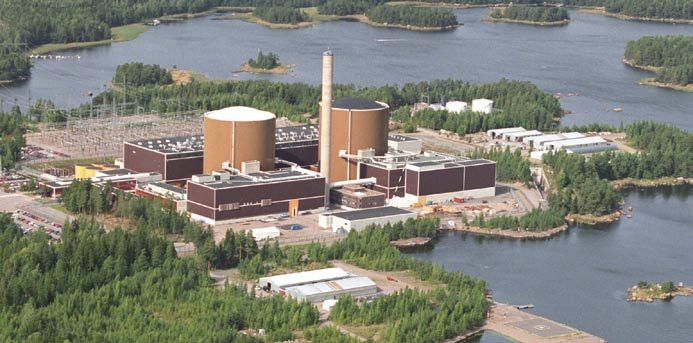
Loviisa Nuclear Power Plant, Finland. (Wikimedia)
What does Cuba in 1962 have in common with Belarus in 2016? They both are human rights-averse, insular fiefdoms of autocratic strongmen on the fringes of the free and democratic world. But there’s one big difference between them. When Cuba proved itself to be a conduit of Russian influence by allowing nuclear warheads to be positioned on its soil, it was sanctioned for it; when Belarus proved itself to be a Trojan horse for Russian nuclear diplomacy, it had its sanctions lifted.
Indeed, in the northwest of Belarus, near the Lithuanian border, is the city of Ostrovets and the site of Belarus’s newest nuclear reactor, due to be completed in 2018 with opaque Russian funding. For a country that has known like few others the horror of nuclear fall-out, the Belarusian authorities do not seem very open to any critical appraisal of the project. President Lukashenko has branded opponents of the plant as “enemies of the state” and the foreign minister has given a brusque response to his Lithuanian counterpart’s concerns about the safety of the plant being built just 50km from the Lithuanian capital, Vilnius.
The Lithuanian foreign minister’s concerns are well founded. They begin with the type of reactor being constructed. The AES-2006 is a relatively new design, and although one has been built before in Russia, the company responsible, Rosatom, who are also behind the Ostrovets plant, was forced by court order to halt construction due to a number of incidences of administrative misconduct.
Which relates to the Lithuanian government’s next objection, the fact the Belarusians have refused to allow stress tests to be conducted or international experts to visit the site. It is just this kind of opacity about the project that has Vilnius on tenterhooks; Lukashenko, by the looks of it, is more concerned with protecting Rosatom’s proprietary rights over the reactor than in alleviating fears about its safety.
Moreover, there is the fact that Rosatom is no normal energy company. The world’s first fully integrated nuclear power company, it provides everything from the mining of the uranium to its enrichment and fabrication into fuel; the construction of the plant, power generation, waste management and plant decommissioning. Operating in 40 countries around the world, it is headed by Sergei Kiriyenko, a staunch Putin ally and one-time Russian Prime Minister.
And this is where the comparison between Cuba and Belarus comes into play: the construction of a nuclear reactor on the Lithuanian border (an EU and NATO member, and recipient of increased US military assistance to deter further Russian advances into Europe) by a Russian company in which the interests of the Russian state are so tightly bound, at a time of such high tensions between Russia and NATO is what gives the situation the smell of a slow burning Cuban missile crisis.
Unfortunately, the alarm bells being rung in Vilnius are not being heard in Brussels, where Lukashenko, in recognition of Belarus’s role in mediating a tentative settlement to the Ukrainian conflict, has been rewarded by having sanctions lifted against 170 individuals and 3 companies linked to his authoritarian regime. The wisdom of rewarding Lukashenko in this manner is brought into question, however, when one reads the UN report about the same election, which they agree passed off peacefully but which is not to say they were free and fair.
Indeed, in the words of UN Special Rapporteur Miklós Haraszti “The incumbent (Lukashenko) was reappointed following an unverifiable turnout and non-transparent ballot count” adding that “the dismal state of human rights has remained unchanged” since the election with “opposition leaders, activists, journalists, and many other citizens… subjected to harassment, administrative procedures and fines.”
By opting to overlook Belarus’s continued human rights abuses in the hope of turning Lukashenko away from Russia’s embrace is a highly questionable strategy. Not only does it sell the people of Belarus and their nascent democracy movement down the river but the EU leaders run the being taken for fools by Lukashenko and Putin. One look at Russia’s strategy of nuclear diplomacy and Belarus’s role in this is enough to suggest that Putin has indeed outfoxed the Europeans again.
This all begs the question: is Belarus a reliable partner for the EU? To answer this lets return to the Ukrainian conflict, where, apart from facilitating the talks which brought an end to open hostilities, Belarus has settled into the role as a facilitator of another kind: as a transit point for Russian’s looking to skirt the ban on direct flights between Russia and Ukraine. Belavia, the Belarusian airline has doubled the number of daily flights to its estranged neighbors to keep up with demand. Another way in which Belarus is benefitting from sanctions is as a black market hub for the import and export of embargoed goods between Russia and the EU.
Tales of ‘Belarusian parmesan’ and seafood (quite a feat for a landlocked country) finding their way into Russia having been smuggled in from Europe are commonplace. In the opposite direction, some 10 billion cigarettes a year are stashed in vehicles, driven to Slovakia via Ukraine and sold throughout Europe at cut rate prices. At one point, the Ukrainian arm of the operations even built a tunnel, seven soccer pitches long and complete with a railway, over the border with Slovakia.
None of this would be allowed if it wasn’t for the blind eye being turned to it by President Lukashenko, who so far has shown no inclination towards treating contraband smuggling as a serious crime, even though it is costing European retailers billions a year in lost revenue. A smuggler state that puts the interests of a Russian nuclear energy company ahead of the security concerns of its European neighbors, the EU would be well advised to keep its friendship with Belarus very much at arm’s length.